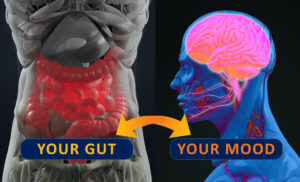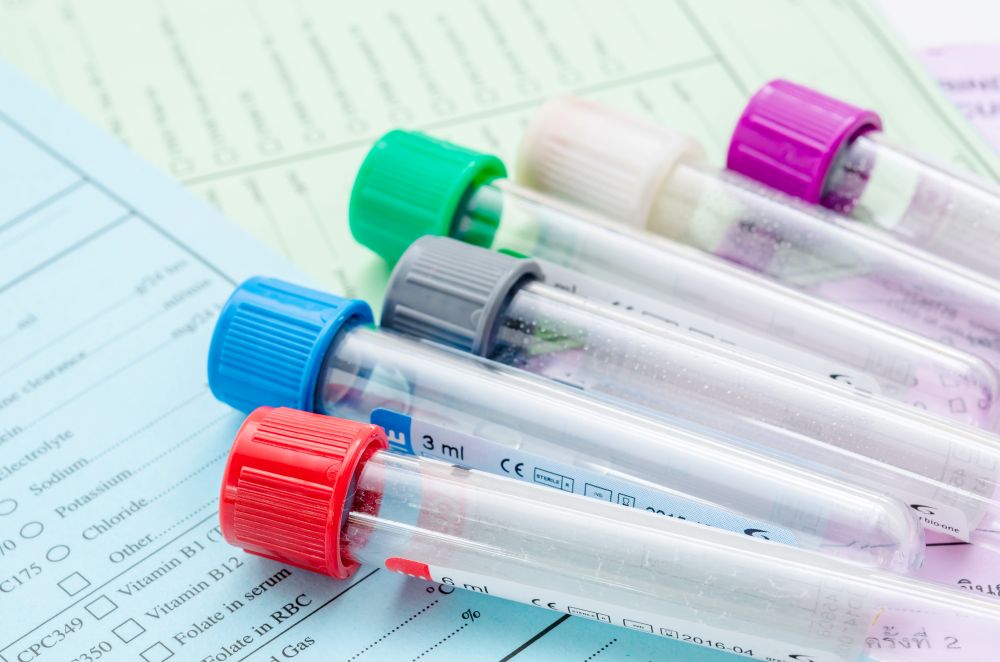
While you may think anxiety, depression, or other mental health issues are all in your head, nothing could be further from the truth!
More and more research is showing that the health of the gut microbiome plays a huge role in our mental wellness.
So, how does this work? Let’s explore the gut-brain connection and give you some ways to improve your gut health. By doing so, we can help you improve your mood, lessen stress, and more.
The Gut-Brain Connection

Have you ever had a gut-wrenching experience?
These are all common, and all have to do with how your gut and brain operate in tandem.
You may have heard of the gut being called the “second brain,” and for good reason. The gut and the brain are intimately connected.
Your gut speaks to your brain via the vagus nerve and can indirectly influence moods like depression, anxiety, sleep, memory and cognition. The physical and chemical connections between your gut and brain are known as the gut-brain axis.
The gut microbiome is a vital part of this gut-brain connection.
Your gut microbiome develops at the same time as the central nervous system, and it has a powerful influence on many mental processes. In fact, studies show that a disrupted gut microbiome may play a major role in certain mental and neurological diseases.
The bacteria in your gut produce many of the neurotransmitters that play key roles in your brain, and your overall mood and mental health. Researchers have discovered that about 90% of all your serotonin (mood-boosting hormone) is produced in the gut.
An imbalanced gut microbiome can lead to so many more issues, like digestive problems, autoimmune disorders, hormonal imbalances and chronic diseases.
That’s why it’s so crucial to do whatever it takes to improve your gut health.
Listen to Your Gut: How to Improve Your Gut Health

Taking good care of your gut is a must. And that starts with what you put into your body.
The Standard American Diet is the opposite of gut-healthy, as it’s full of high-fat, high-sugar and processed foods.
Instead, focus on eating whole foods, plenty of fruits and vegetables, legumes, beans and whole grains, as well as fermented foods.
Stress-reducing activities are also vital, including exercise. Exercise reduces the inflammatory responses within the body and can reduce the effects of mental and physical stress.
Sleep is also a key stress-reducing activity—and lack of sleep can have a direct effect on gut health.
As you can see, getting your gut microbiome in balance can improve your health, and even reverse some problems you may be having. And we are here to help you do just that.
Dr. Berutti and Melanie Martin, PA, are experts on gut health, as well as hormone balancing, thyroid balancing and anti-aging. They can provide you with the professional expertise needed so you can feel better and lead a longer and healthier life.
Gut Health Testing at the Dynamic Life Health Center in Southlake, TX
To help you better determine the health of your gut microbiome, we offer nutritional testing.
The tests we offer include, but are not limited to:
- Vibrant America Food Sensitivities Testing – a blood test to determine if you have sensitivities to hundreds of common foods.
- Gut Zoomer – the most comprehensive gut microbiome test on the market.
- Genova GI Effects Test – a stool test that looks at overall gut health, the function of your digestive system, inflammation, and imbalances within the microbiome, including an analysis of bacteria, yeast, and parasites.
- Genova SIBO Test – a breath test to evaluate bacterial overgrowth in the small intestine.

